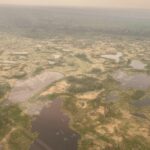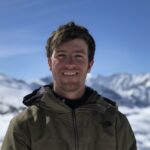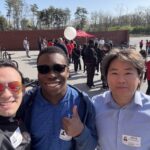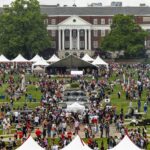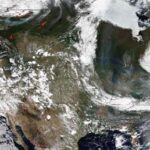By Teri West
Two University of Maryland social scientists are embarking on a two-year research project that investigates how meteorologists in the U.S. Southeast communicate tornado warnings and watches.
Brooke Liu and Anita Atwell Seate will complete observational studies of forecasters in three different states to understand the decision making process as well as conduct general and longitudinal surveys. The project is funded by the National Oceanic and Atmospheric Administration (NOAA) and is part of a broader experiment about tornado impact in the region called Verification of the Origins of Ration in Tornadoes Experiment-Southeast (VORTEX-SE).
Liu recently completed a project on disaster messaging in the same region, which analyzed whether the public feels that there are too many false warnings. She and her team discovered that people actually want more information when it comes to disaster predictions, she said.
She believes that her new project is the first to flip the model and research the people responsible for sending the warnings.
“We’re really entering into an unknown research area and of course the decision to warn, how you warn totally shapes the message,” Liu said. “So we can study all the messages we want and can give advice, but there are probably constraints on how these messages can be developed and a lot of expertise that comes into these messages that we’re not really considering in the research record.”
VORTEX-SE intends to comprehensively study tornados in the region through both the meteorology and social science fields. While there is ample research on tornados in the Midwest, it is lacking for the Southeast, Liu said.
“In the Southeast you can get tornados year-round because they are based on strong thunderstorms,” Atwell Seate said.
A variety of factors such as tornados occurring at night as well as in densely populated areas make Southeastern tornados unique from their Midwestern counterparts and provide obstacles for both forecasters and the public.
Liu is an associate professor in the Department of Communications where her research focuses on effective crisis communications. Atwell Seate is an assistant professor in the department. She quantitatively studies how identities such as race and gender influence message processing, but she also describes herself as a “big weather nerd” and is a trained weather spotter.
Liu and Atwell Seate say that completing both qualitative and quantitative research will allow for a more complete understanding of the situation that they are studying. The pair will visit Nashville, Tenn., Atlanta and Huntsville, Ala. to observe forecasters and then complete a cross sectional general survey.
The pair will visit Nashville, Tenn., Huntsville, Ala. and Atlanta to observe forecasters and then complete a cross sectional general survey.
“We really want to partner with [forecasters] and say ‘What do you think the problems are? How can we help you solve these problems?’” Atwell Seate said. “So then when we come back with our recommendations they’re really rooted in the problems that the forecasters themselves are seeing.”
Following the general survey, the pair will then study individual forecasters through a six-month longitudinal survey to determine how previous experiences with disaster communication might shape warning decisions over time.
“In a typical kind of scientific approach what we’ve pitched to do could take someone else eight to ten years to do, and we’ve promised it in two, so it’s very scary,” Atwell Seate laughed. “But…at the end I think we’re going to have real recommendations that are meaningful and can save lives and then that to us is worth the work.”

